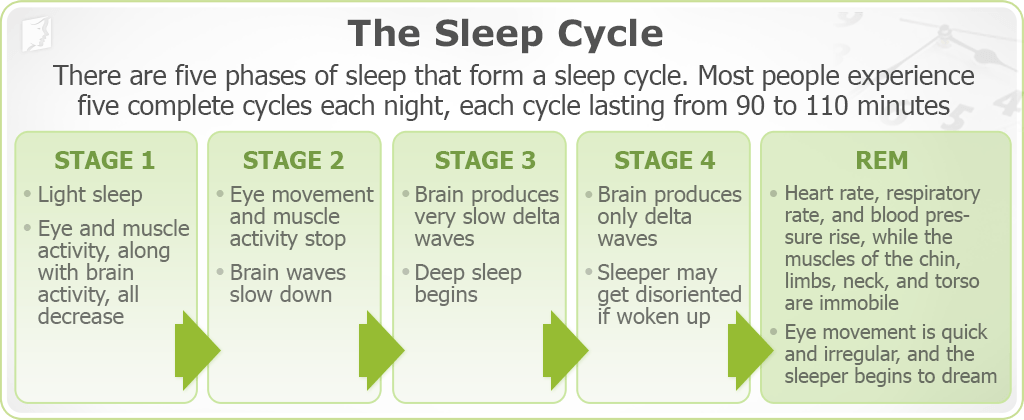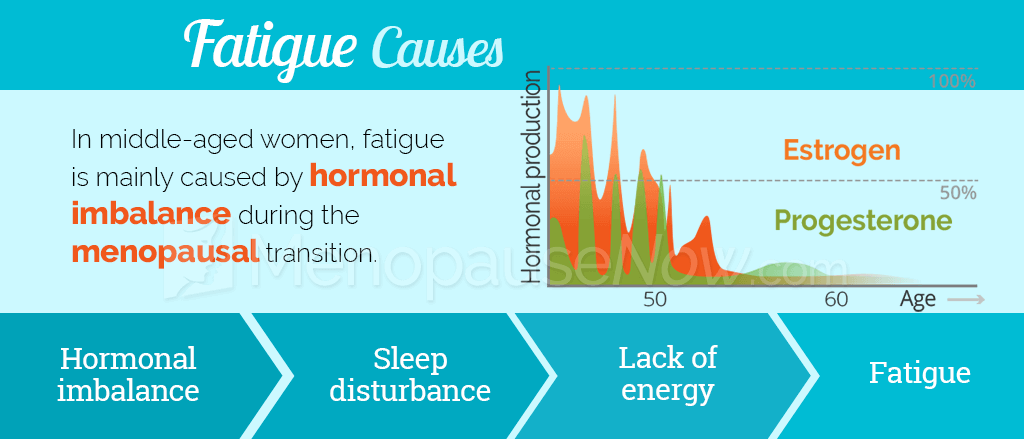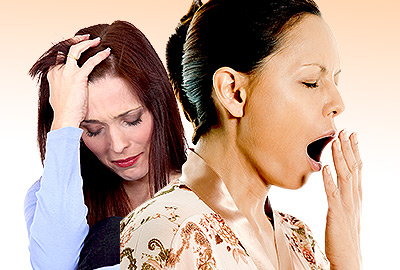Although it is common, fatigue can be one of the more frustrating symptoms of menopause. It can negatively impact many aspects of a woman's personal and professional life, and it can even take its toll on her overall health. Fortunately, by better understanding its causes, women can treat this frustrating symptom.
The primary cause of fatigue in middle aged women is unbalanced hormone levels, although there are exceptions to this rule. Keep reading to learn more about these hormonal causes, as well as the other potential triggers, in order to treat fatigue.
Hormonal Causes
For women who are experiencing menopause, fatigue is typically due to hormone fluctuations. Estrogen and progesterone, the two main hormones influenced by menopause, play a key role in sleep functions. When they are thrown out of balance, however, a woman's sleep cycle is disturbed, which often leads to fatigue.
Estrogen
This hormone has a role in regulating sleep, wakefulness, and REM phases. During the menopause transition, estrogen levels fluctuate up and down. A spike followed by a decline in estrogen levels may suppress REM sleep or disrupt the sleep cycle in general.
Progesterone
This hormone, by contrast, regulates sleep induction. As progesterone levels drop, women may have difficulty falling asleep. This may trigger insomnia, which can lead to fatigue during the day.

Other hormones
Different hormones that are involved in this process include the thyroid and adrenal hormones, as well as melatonin. These hormones have an effect on sleep and metabolism. Estrogen also influences and regulates these hormones to a degree. When levels are in flux, the sleep cycle may also be disrupted, leading to feelings of fatigue.
Along with the hormonal causes outlined above, there are several lifestyle factors that can trigger fatigue. Other diseases may lead to fatigue as well.

Continue reading to learn more about these other possibilities, as a combination of factors may cause fatigue.
Other Causes of Fatigue
In addition to the causes outlined above, there are other, less common causes that can lead to fatigue in menopausal women. If fatigue is experienced in conjunction with other symptoms, consulting a trusted medical professional is recommended. For instance, if chronic fatigue is experienced along with weight gain, the problem may be a thyroid dysfunction, which is one of the more common conditions listed.
Fatigue-causing Diseases
- Thyroid dysfunction
- Heart disease
- Anemia
- Insomnia, narcolepsy, or sleep apnea
- Depression
- Anxiety
Risk Factors for Chronic Fatigue
- Allergies
- Excess alcohol and caffeine consumption
- Poor diet
- Stress
- Jet lag
- Sedentary lifestyle
- Boredom
Certain lifestyle choices, such as a poor diet or over-consumption of sugar and caffeine, can negatively impact sleep quality, leading to fatigue during menopause. Exercise is important in maintaining overall health. However, exercising too close to bedtime can make falling asleep difficult, potentially perpetuating fatigue. Whatever the cause, it is important to manage fatigue before it negatively impacts daily life.
As the main cause of fatigue is changes in hormone levels, the most effective way to beat fatigue is to treat it at the hormonal level. Keep reading to learn more about treatments for fatigue in order to overcome it.
Sources
- Andersen, M.L. (2006). Effects of progesterone on sleep: a possible pharmacological treatment for sleep-breathing disorders? Current Medicinal Chemistry, 13(29), 3575-3582. Retrieved from http://www.ncbi.nlm.nih.gov/pubmed/17168724
- National Health Service UK. (2015). Chronic fatigue syndrome. Retrieved May 3, 2016, from http://www.nhs.uk/conditions/Chronic-fatigue-syndrome/Pages/Introduction.aspx
- Office on Women's Health. (2014). Chronic fatigue syndrome fact sheet. Retrieved May 3, 2016, from http://womenshealth.gov/publications/our-publications/fact-sheet/chronic-fatigue-syndrome.html
- Santin, A.P. & Furlanetto, T.W. (2011). Role of Estrogen in Thyroid Function and Growth Regulation. Journal of Thyroid Research, 875125. doi: 10.4061/2011/875125
- Schwartz, M.D. & Mong, J.A. (2013). Estradiol modulates recovery of REM sleep in a time-of-day-dependent manner. American Journal of Physiology: Regulatory, Integrative and Comparative Physiology, 305(3), R271-280. doi: 10.1152/ajpregu.00474.2012



